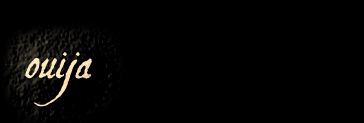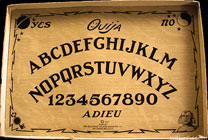
Contact | © 2007 | Robert Murch OUIJA® and MYSTIFYING ORACLE® are both trademarks of Hasbro, Inc. |

Search WilliamFuld.com
|
 |
 |
 |
 |
 |
 |
 |
|||||||
|
History | People | Boards | Stencils | Patents & Trademarks | Factories | Advertisements | Articles | Entertainment | Customer Letters | Other Factories Baltimore Talking Board Factory
The Baltimore Talking Board Company of Maryland began producing Ouija boards in July of 1920. The company was the partnership of Charles Cahn and Gilbert Michael. The address 36 & 38 South Paca Street was shared with their other business; a printing company called Adpress. Charles Cahn was the company's Secretary, and Gilbert Michael was its Vice President. They made Ouija boards in three different sizes. The smallest called the “Wee Ouija board” was 5” X 8”, the middle size was 8” X 12”, and the largest one which they produced very few of was 14” X 22”. These Ouija boards were made of paper over cardboard rather than wood as most boards were at the time. On September 16th 1920 two gentlemen representing the Internal Revenue Service paid a visit to the company and after reviewing their products and, sales directed them to pay a tax on the Ouija boards they sold for the month of July. The total came to $202.81 which was paid under protest in September. Believing that Ouija boards should not be taxed as games or sporting goods Charles and Gilbert filed for a refund on October 8th which was denied on November 5th. On November 20th 1920 the company took Joshua W. Miles - Collector of Internal Revenue for the District of Maryland and Delaware to court. At the very least it alleged that the small “Wee Ouija board” was sold for only ten cents a piece and were advertisements or small children's toys excusing them from the tax.
Though the official attorney of record for the Baltimore Talking Board Company was Fisher and Fisher, Washington Bowie Jr. is also listed as assisting in the case. On March 4th 1921 Charles Cahn testified in court and explained his position and described their three Ouija boards. When asked what connection he had to William Fuld he testified that his company had no such association and that he had never even met William Fuld. However, since he was using the Ouija name and one of his lawyers was Washington Bowie Jr., he or his partner must have struck a leasing deal. William's 1915 talking board patent was entered into evidence. On June 1st District Court Judge Rose ruled against the Baltimore Talking Board company and for the IRS and Joshua Miles citing the tax had been collected legally.
On June 9th 1921 the company began the appeal process filing a Bill of Exception. On December 6th 1921 the case was argued in the Circuit Court of Appeals, Fourth District presided by over Judges Knapp, Woods, and Waddell. On February 9th 1922 the court sided with the IRS and Joshua Miles. Judge Woods wrote the majority opinion affirming that Ouija boards, despite their size can be legally taxed. Judge Knapp dissented writing that he felt the Ouija board did not meet the criteria of a game as described by the statutes and because of its unique characteristics should be exempt of the tax law. The Baltimore Talking Board Company then appealed to the U.S. Supreme Court on May 14th 1922. Less than a month later the Supreme Court refused to hear the case on June 5th 1922 ending the long debate on whether the Ouija board should be taxed as a game. The Baltimore Talking Board Company lost and had to pay both the lawyer fees and cost of the proceedings. This effectively put an end to their Ouija business. Not many of their Ouija boards remain and all three are considered particularly rare. |
|||||||


